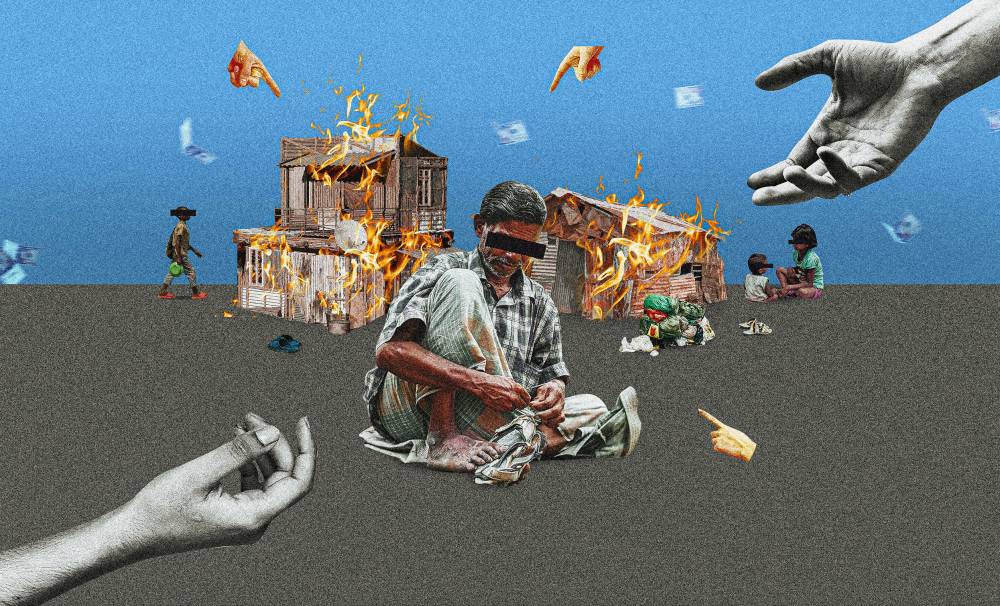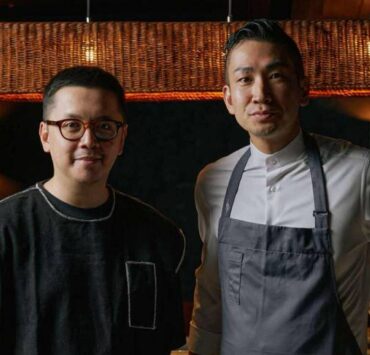In our struggle and disgust, we have forgotten our humanity

The saying goes, “Di baleng manakawan, huwag lang masunugan.” Fires don’t only engulf and threaten homes and properties, but they also affect lives that have been built over the years. It forces people back to square one without anything but ashes. For the capable, it’s a hindrance they can recover from. But for the poor, it’s the sudden loss of everything they’ve worked for.
Tragic. Saddening. Unfortunate. These are the expected responses to the recent “Task Force Bravo-Charlie” fire at Bldg. 13, Aroma, Temporary Housing, Brgy. 105, Zone 8, District 1 in Tondo, Manila. And all the more so, as it followed the scene of residents—amid both flood and ash—fighting over what they can salvage and looting loose electric wires in hopes of selling them for P400 per kilo at the nearby junk shop.
Faced with a scene demonstrating the desperation to provide and earn immediately after a tragedy, you’d expect words of compassion, worry, and support from their fellow Filipinos. Instead, the reactions are a mix of disgust, apathy, and strangely enough, joy in their misfortune.
But we’re all in the same boat
One comment reads, “Ganyan talaga diyan, ugaling squatter.” Another says, “‘Wag niyo na sana ibalik ‘yong kuryente diyan,” and “Sa amin ipapasa ng Meralco ang losses.” On one end, we have those who believe that the poor are solely poor because of their own choices and mistakes—that a fire is rightful retribution for their laziness—and on another, people who blame the less fortunate for the country’s existing problems.
It’s like blaming environmental degradation on someone who threw their trash in the wrong bin. Sure, it would have done some good, but let’s not forget the millions of factories spewing black smoke into the sky.
Unfortunately, we’re only playing a classist blame game where we’ve placed the ills of the nation on the shoulders of men and women just fighting to put food on the table. But in reality, we’re all simply on the same ride—one, who risks their humanity and dignity to dig through both dirt and trash for a proper meal; and the other, who’s forgotten their humanity in disgust of their fellow Filipino, blaming the former for a broken system that affects everyone all the same.
Implemented only this July, R.A. 12214 or the “Capital Markets Efficiency Promotion Act (CMEPA)” lowered the country’s stock transaction tax from 0.6 percent (the highest in Southeast Asia) to 0.1 percent to lower the financial burden on local and international investors. Meanwhile, under the same law, tax exemptions have been removed from interest income gained from long-term deposits.
What does this all mean? On top of income tax, value-added tax, rising prices, and stagnating salaries, savings once assured to steadily grow inside banks, are now taxable under R.A. 12214.
“It empowers the small business owner, the young professional, and the overseas Filipino worker to start investing their hard-earned money to build a better future,” says President Ferdinand Marcos Jr. in a statement explaining the ‘benefits’ of CMEPA. So under R.A. 12214, your long-term savings are now taxed, but you won’t have to pay as high a fee as before to invest your “non-existent disposable income” to a “totally stable” financial market—assuming of course, you know the first thing about investing.
Now, who’s really benefiting from this?
Who are we blaming next?
Discipline. Respect. The rule of law. These are ideals we flaunt as markers of a well-off society—characteristics we’ve observed from our neighbors that we wish to see in our own nation.
There’s nothing wrong with desiring cleaner roads, observed traffic rules, and improved citizen behavior, as seen in countries such as Singapore or South Korea. A noble desire, undoubtedly, but it is one perverted with a deep-seated hatred for “pasaways”—or better known as scapegoats.
These scapegoats have taken the form of various groups of people in recent years. Most notably, impoverished drug users who out of nowhere, became the sole focus of the previous government—whose extermination would’ve supposedly guaranteed a better, more prosperous Philippines. Tens of thousands killed. But has anything changed?
Even during the pandemic, the country’s high COVID-19 cases were blamed on the “pasaway” yet again, or more specifically, those who didn’t have the means to properly quarantine, let alone wear the proper masks and face shields. “Sumunod na lang,” they would say, and yet it was the VIPs who frequently breached quarantine protocols—hosting parties without regard for social distancing or even ignoring mask mandates.
More recently, the No Contact Apprehension Policy (NCAP) was partly put in place to reduce incidences of traffic violations, as well as congestion from roadside apprehension. But in reality, the transportation crisis is the result of roads being unable to sustain the number of cars on them, and a lackluster public transport system that incentivizes those capable of using private vehicles.
Again, the ills of the nation are placed on the shoulders of the citizenry. And that’s not all there is to it.
The absence of choice
Now, would not being “pasaway” fix anything at all? Or would we just go on and blame something (or someone) else?
Going back to the less fortunate Filipino—not to excuse the crimes being committed in broad daylight—it begs the question: is their poverty or their less-than-desirable behavior indicative of the country’s status as a third world country, or merely an unfortunate effect of it?
“There are people who are cruel, selfish, aggressive, and narcissistic, but that’s not who they are… If somebody said the world is a horrible place where it’s dog-eat-dog, everyone against everybody else… How would that person have to be if that’s the world they live in?” said Dr. Gabor Maté, author and physician, in a conversation with comedian and host, Hasan Minhaj.
Poverty, after all, doesn’t only equate to being poor. It is the absence of choice. How can we judge someone for a decision based on their perceived selection of choices—and the fact that said choices are, in fact, limited to begin with?

















